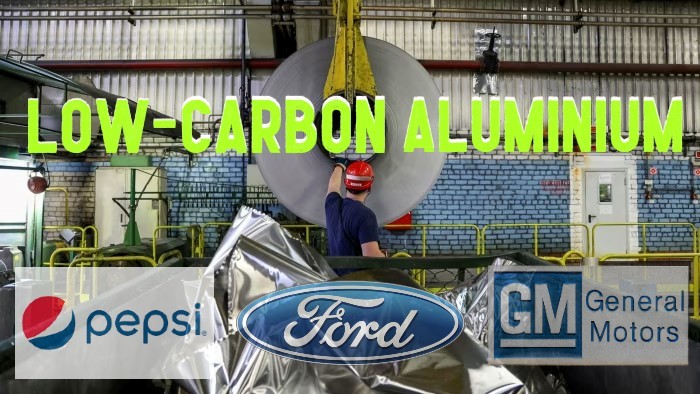

In order to retain and create manufacturing jobs, reduce industrial emissions, and grow a vitally important industry, the Department of Energy must invest in American-made clean aluminium amidst plummeting primary aluminium production in the U.S. This is the message conveyed by a letter sent by leading companies such as Ford Motor Co., General Motors, Pepsi Co., Ball Corp., Rivian, SunPower and eight others to U.S. Department of Energy (DOE) Secretary Jennifer Granholm.

The letter suggests that by using investments from the Inflation Reduction Act (IRA) to expand and secure an affordable supply of clean energy, the Biden administration can modernise and grow this industry instead of allowing American-made primary aluminium to disappear.
The Global Director of Sustainability, Homologation and Compliance at Ford, Cynthia Williams, illustrated: "Ford is committed to achieving carbon neutrality across our vehicles, operations and supply chain no later than 2050, and sourcing domestically produced, lower-carbon primary aluminium is part of a host of actions we are taking that will help us meet our ambitious sustainability goals."
"The Inflation Reduction Act presents a powerful opportunity for the Department of Energy to prioritise American-made, clean sources of aluminium, which will, in turn, make more sustainable options available to companies like Ford. It's going to take all of us – manufacturers, suppliers, energy providers and government – working together to build a better future that's not just good for business but also for people and the planet," Williams added.
The letter was made available on www.buycleanaluminum.com, and it was also published in full-page ads in five newspapers: The Albany Times-Union, The St. Louis Post-Dispatch, The Louisville Courier-Journal, the South Carolina Post and Courier, and the Indianapolis Star. Each newspaper was selected for its location in a market with one of the remaining six primary aluminium smelters.
The Chief Sustainability Officer for Ball Corporation, Ramon Arratia, asserted: "Ball Corporation is working to cut more than half of the greenhouse gas emissions from operations and supply chains by 2030."
"As a significant buyer of aluminium can sheet, we're using our purchasing power to help transform the aluminium beverage packaging sector to low-carbon primary aluminium and low-carbon recycled aluminium, but we can't do it alone. The Biden administration has an opportunity right now to rapidly accelerate the decarbonisation of primary aluminium refining and smelting in the U.S. and make America a global leader in producing clean aluminium," Ramon pointed out.
The proposed measures in the letter aim to ensure a strong and sustainable supply chain of clean aluminium manufacturing in the U.S. This would not only result in reduced emissions but also the creation of well-paying jobs for families. Additionally, the implementation of these measures would unlock the full potential of the crucial climate law. The companies behind the letter have emphasised the threat to the American primary aluminium industry's survival, particularly as demand for the metal is expected to surge.
The letter analysed: "Spiking electricity prices, lack of access to low-cost renewable energy, and insufficient federal investment have pushed the remaining six primary smelters to the brink. The IRA is poised to make the largest-ever investment in U.S. manufacturing, supercharging aluminium-dependent clean energy technologies. In order to meet increased aluminium demand that will affect all our industries, the U.S. must invest heavily in supply."
Everyday food and beverage products, as well as the foundation of the clean energy economy, rely heavily on aluminium and its 100% recyclability. This versatile material is used in the manufacturing of solar panels, wind turbines, and electric vehicles, among other things. With global demand for aluminium predicted to increase significantly over the next few decades, the United States has an opportunity to capitalise on this growing market.
However, the industry has faced numerous challenges in recent months, including layoffs and closures due to fluctuating fuel prices. Fortunately, the Department of Energy is stepping in with the Investment Tax Credit for Clean Energy Manufacturing, which offers a chance for aluminium companies to invest in environmentally friendly manufacturing processes and power supplies. This could be a game-changer for the U.S. primary aluminium industry.
The President of SunEarth, Adam Chrisman, mentioned: "SunEarth is committed to not only providing sustainable solar hot water solutions but also to supporting American manufacturing."
"Our use of low carbon aluminium in our products is a testament to our dedication to reducing our environmental impact and promoting domestic content. By incorporating this eco-friendly material, we not only add value to our systems but also to the U.S. manufacturing industry as a whole. We are proud to be a part of the movement for a greener future, and we will continue to lead the charge in sustainable solar technology," Chrisman concluded.
The aluminium industry is currently facing a significant challenge due to its reliance on fossil fuels. According to recent reports, power supply accounts for up to 40% of the total production costs for smelters in the United States. As a result, some smelters in Kentucky and Indiana have been forced to curtail their operations due to high energy costs resulting from volatile fossil fuel prices.
However, there is a ray of hope. In the past decade, the price of electricity generated from renewable sources such as wind and solar has experienced a significant decrease. This presents an opportunity for the federal government to secure low-cost electricity supplies in the short term while also investing in long-term supplies of cheap, renewable energy. By doing so, the government can help prevent smelters from becoming priced out of the market and ensure the continued viability of the aluminium industry.
Responses








